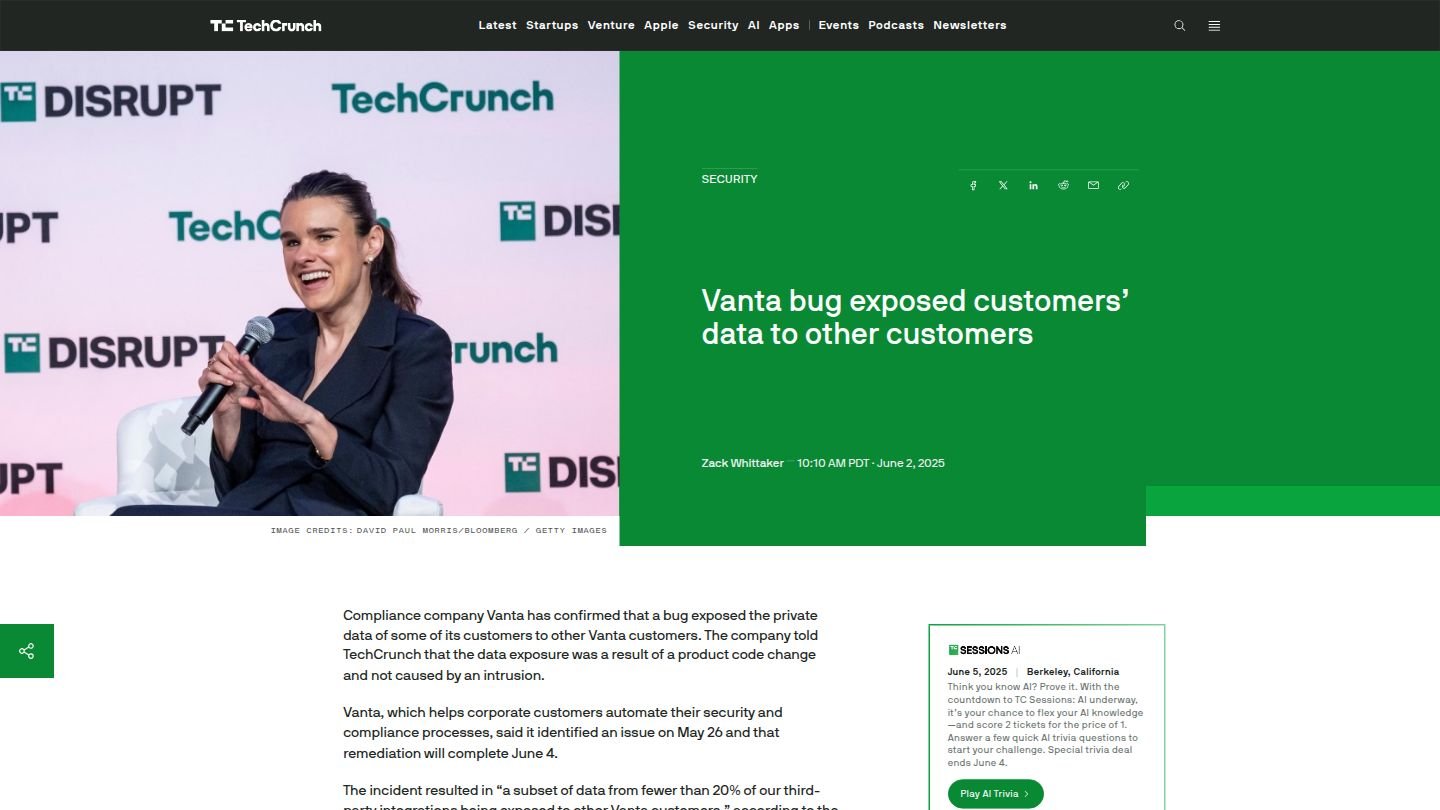Vanta Data Leak 2025
Security Incident Report
Vanta Data Exposure Bug
Compliance company Vanta confirmed a bug that exposed private customer data to other Vanta customers due to a product code change.
No credit card required
Key Facts and Timeline
Issue identified
Remediation complete
of customers affected
estimated affected
of integrations
account data
Product change
an intrusion
Data Exposed
- • Employee names and roles
- • Account configuration information
- • Multi-factor authentication usage data
- • Tool configuration details
Customer Notification
Affected customers were notified that "employee account data was erroneously pulled into your Vanta instance, as well as out of your Vanta instance into other customers' instances."
"A subset of data from fewer than 20% of our third-party integrations being exposed to other Vanta customers. Fewer than 4% of Vanta customers were affected, and have all been notified."— Jeremy Epling, Chief Product Officer at Vanta
What is Comp AI?
Comp AI is a modern compliance platform that provides an alternative to proprietary solutions like Vanta. It offers automated security and compliance monitoring with transparent processes and community-driven development.
Benefits of Modern Compliance Platforms
Powerful integrations automatically collect evidence on your behalf
Detect security risks and compliance gaps in minutes
Frameworks like SOC 2, ISO 27001, and GDPR supported out of the box
Comprehensive risk and vendor management capabilities
Get compliant in weeks, not months
Get started instantly with no sales calls required
How Modern Compliance Platforms Provide Better Security
- • Automated Monitoring: Continuous oversight could detect issues immediately
- • Evidence Collection: Automated systems reduce human error in data handling
- • Transparent Processes: Clear visibility into compliance and security status
- • Rapid Response: Modern platforms can implement fixes and updates quickly
$150M Series C (July 2024)
Vanta helps corporate customers automate their security and compliance processes, making it a critical service provider for many organizations' security infrastructure.
Original Source: TechCrunch Investigation
This report is based on original investigative reporting by TechCrunch's security correspondent Zack Whittaker, published on June 2, 2025.
Read the full TechCrunch article
What Happened During the Vanta Data Leak?
The Vanta data leak stemmed from a fundamental failure in data segregation within Vanta's platform architecture. Sensitive customer information, which should have remained strictly isolated within individual tenant environments, became accessible across different customer accounts. This cross-contamination represents a severe security lapse, particularly for a multi-tenant software-as-a-service (SaaS) provider.
This incident underscores a critical vulnerability in how compliance platforms manage highly sensitive customer data. Organizations entrusting their confidential information expect robust isolation, precisely to prevent such cross-customer data exposures.
Technical Causes Behind the Vanta Data Leak
While Vanta has not released exhaustive technical details, the Vanta data leak likely originated from flaws in their multi-tenant system architecture. Such platforms require strict data isolation, often using database partitioning, application-level controls, or containerization.
The "product code change" cited as the cause suggests developers may have inadvertently altered critical isolation logic. This could involve errors in database queries, API endpoint validation, or data processing workflows that mixed customer datasets.
Scale and Impact of the Vanta Data Breach
With Vanta claiming over 10,000 customers, the "fewer than 4%" affected by the Vanta data leak suggests hundreds of organizations experienced data exposure. The impact is magnified as it involved data from various connected systems through third-party integrations.
Bidirectional Data Flow Concern
Some customers affected by the Vanta data leak reported bidirectional data flow: their information was exposed, and they simultaneously received data from other organizations. This multiplies the potential impact and creates complex legal and compliance challenges.
Lessons from the Vanta Data Leak
Vendor oversight must be ongoing, not just during initial selection
Scrutinize tenant isolation mechanisms in multi-tenant platforms
Plan for vendor security failures in your incident response
Ensure service agreements adequately cover breach scenarios
Don't rely completely on a single compliance vendor
Limit data shared with third-party platforms